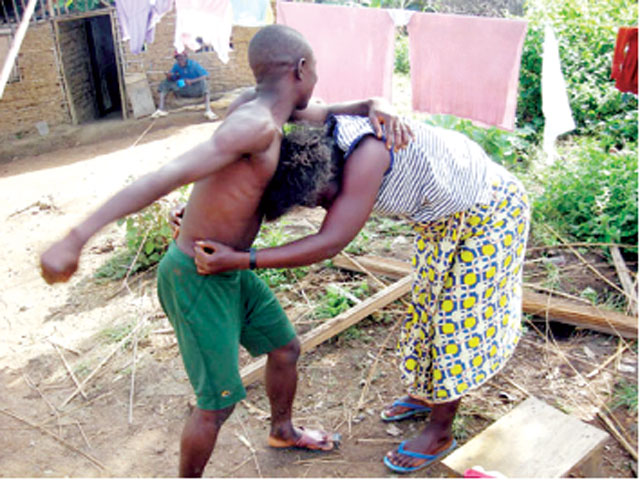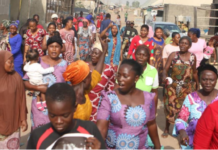‘We are brought up to think suffering this violence is OK’

Domestic violence, widespread sexual harassment and abuse are serious problems in Nigeria. One government survey, found that almost a third of all women have experienced physical violence, which encompasses battery, marital rape and even murder, at the hands of their intimate partners. But the same survey found nearly half women believe a husband is justified in beating his wife for a number of reasons, including going out without telling him, or neglecting the children.
Marriage in Nigeria is regarded as a prized attainment, and there is a powerful social stigma around reporting violence, or, worse still, leaving your husband. Despite high levels of violence within relationships in Nigeria, wedding vows are still regarded as sacred, and women are urged to stay with bullying husbands. As a result, many women are trapped in violent relationships. This is worse for poor women who cannot afford to find alternative accommodation to escape from their violent partners.
Titilola Vivour-Adeniyi, Coordinator of to the Lagos State Domestic and Sexual Violence Response Team says most of the women who come to her team only want the violence to stop, and will not consider leaving their husband. Similarly, most women are not prepared to take legal action against their husbands. Very few are prepared to testify in court.
Vivour-Adeniyi says: “I think it is the cultural perception attached to a woman who walks out of a marriage. She is seen to be a failure, she is seen to be promiscuous and most times those are the grounds on which these perpetrators [denounce] the woman. So, they want to stay in the relationships to keep up appearances.”
In many cases there is no support from the family for a woman who is considering leaving her violent husband or partner. Many family members are more worried about the family’s reputation than the safety of their sister or other relative.
Conservative religious doctrine reinforces patriarchal traditions that play into gender-based violence. Churches and Mosques emphasise the sanctity of marriage and many preach that wives should obey their husbands with the implication that women should be punished if they are disobedient. This provides an excuse and justification for husbands who abuse their wives.
Though hundreds of abused women walked through the doors of their centre, in 2017, Vivour-Adeniyi and her team have secured only 20 restraining orders and five criminal prosecutions. “Nobody wants to be the one to have sent her husband to jail.”
Domestic violence happens in all classes, but it is worse for poor women. As one woman said, “At least I work and I earn a salary. What if I was someone that doesn’t have money? What if I was a housewife with no money, no family support? It would have been terrible. Not that it is not terrible … but it would have been worse.”
Domestic violence is a global problem. Recent revelations about Hollywood film producer Harvey Weinstein’s abuse and rape of women have exposed the sexism at the heart of society. Many people knew about Weinstein’s behaviour, yet it continued for decades. Several women have said they didn’t come forward because they felt Weinstein was so powerful he would destroy their lives.
The international campaign has given confidence to many women, they are no longer prepared to accept such abuse. Millions of women have used the #MeToo social media campaign to describe their experiences. The scale of the revelations has been unprecedented, inspiring fightback.
In America, the Women’s Marches in January surprised organizers and participants alike. They were similar to the massive turnouts that made January 21, 2017 the largest single day of protest in U.S. history.
In 2012, huge demonstrations swept the Indian capital city of Delhi after 23-year-old student Jyoti Singh died after being gang raped. Thousands marched in other Indian cities demanding that more be done to protect women. Little has really changed and so many cases of sexual violence are not dealt with adequately by the police or the courts.
Five alleged rapes, mostly of children, within five days in January, in the northern Indian state of Haryana, forced the issue of sexual violence back onto India’s national agenda, provoking widespread condemnation.
Vivour-Adeniyi of DSVRT thinks that it’s time to look again at the way marriage is viewed. “A woman is not deemed complete until she is married. [And then] it’s not enough to be married – you need to stay married and have children, obviously.” Young women should not be under so much pressure to find a husband. We know that many marriages do not work. Couples, especially the women, should be supported when they are in abusive or violent relationships.
Women should be free to divorce if the marriage is not working. Boys and girls should be taught that marriage should be a partnership between two equal people, and based on mutual respect as much as love. One should not be required to obey the other.
In recent years many trade unions have started to take more action and many have gender officers. But we need to ensure that more is done. Pickets should be held and protests should be organised by trade unions, workplaces, community groups and student unions against the harassment and abuse of women. We should declare war on harassment and all institutions that allow it or take insufficient steps to reduce it.
by Tina NDI








